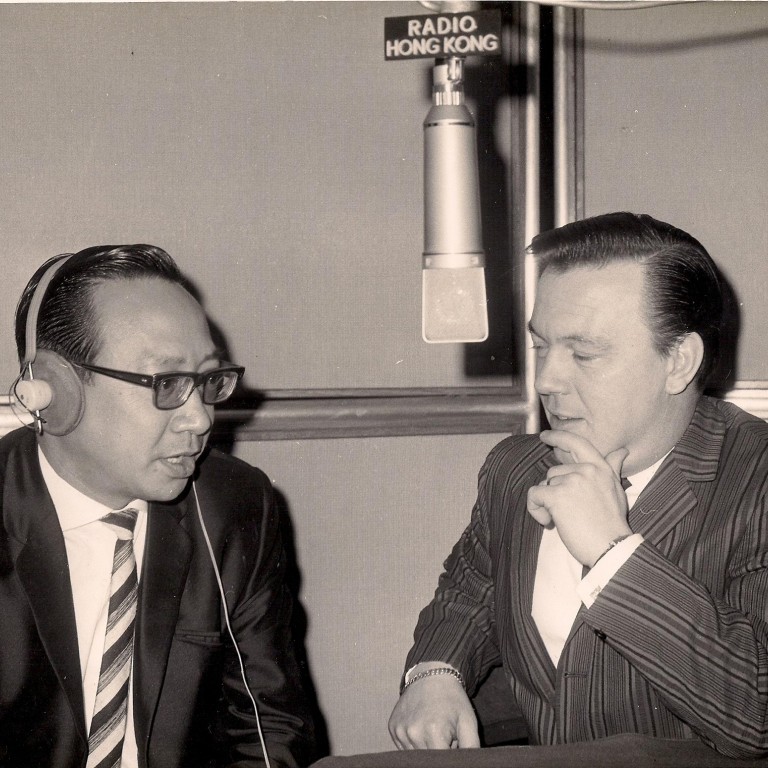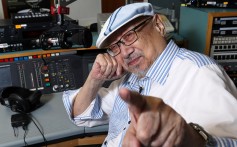
In the din of WW2 refugee aid efforts, Hong Kong icon 'Uncle Ray' discovers his career-making love for music
On December 8, 1941, Hong Kong became one of the first battlegrounds in the Pacific campaign of the invading Japanese. On the same morning as the attack on Pearl Harbour, Japanese forces attacked British Hong Kong without any prior declaration of war. Japan's act of aggression was met with fierce resistance but the colony fell after 18 days of intense fighting. For three years and eight months, the people of Hong Kong lived under Japanese Occupation. This is one of a series of stories in remembrance of the Battle of Hong Kong and the dark days that followed.
Ray Cordeiro’s lifelong love for music began during the war – and in the kitchen.
“Uncle Ray”, the music deejay with his nightly programme All the Way with Ray at RTHK was a 17-year old St Joseph College student when war struck from nowhere.

“The war came unexpectedly for everyone, except for the very senior officials who knew it was coming. The British were so smart and digging into lots of tunnels. Nobody thought of what’s that for until the Japanese attacked,” he said.
Cordeiro remembers the moment he caught sight of the Japanese warplanes.
“I was at my home in Wan Chai. In those days you didn’t often see planes, maybe one or two training flights. But what I saw from the veranda was a string of planes flying in formation. I had never seen such a scene. It was like a movie,” he said.
“We were so innocent and didn’t know those droppings were bombs until they started to explode. Everybody rushed for the tunnels. Only then did we realise the British knew in advance as they’d been through the First World War and tunnels were the safest place to go in wartime.”
As one of the two boys in the family, Cordeiro’s mother and four sisters left for Macau shortly after. He and his old brother, Armando, stayed behind with his father, a senior staffer at the Hong Kong Bank.
“The Japanese were very vicious and they were raping women. I actually heard women crying for help,” he said.
“And you had to bow to the Japanese soldiers at the sentry or else they would hit you on the head with the butt of the rifles. That was a way to say they were the boss and we had to kowtow to them,” he added.
“So I stayed with my dad, who couldn’t leave because he was quite senior at the bank. But at some point he asked me to join my mother in Macau. That was just a day before the Japanese started arresting the senior staff of Hong Kong Bank and they came for him the next day. But he went just in time to join us in Macau. We were very lucky,” he recalled.
Macau was spared from war as a colony of Portugal, which had declared neutrality. There, the Cordeiro family stayed on a floating boat for refugees. But Macau was almost like a second home as his mother had been born in the army barracks in Macau and her father was a commando there.
So she was made head chef of the kitchen and cooked rice for 140 refugees everyday. Her assistant was Cordeiro. That was when he discovered cooking pans and woks of all sizes made some pretty good noise.
“It may sound funny to you, but that’s how I started my musical career,” the nonagenarian said with a laugh.
“I always had a special affinity for drums and wanted to be a drummer. At very young age I wanted to be somebody and be the centre of attraction. At any big band, the drummer is always in the centre, and there’s where I wanted to be,” he said.
He would use chopsticks to hit the pots and pans all the time “until my mother told me to stop as I was giving her headache,” he said.
“I didn’t break any of the pots though some did go out of shape.”
“That was the start of my love for playing drums. A few years later, I would quit my job at Hong Kong Bank, which I joined through my father’s connection shortly after returning to Hong Kong after the war. I spent four boring years there and then I decided to become a drummer of a jazz trio at Chantecler Restaurant in Tsim Sha Tsui. My father almost had a heart attack when I told him my decision,” he recalled.
Later that year, in 1949, the 25-year old joined Radio Rediffusion, a cable service with four channels charging HK$10 per month, and launched his career in broadcasting. That was the year his Guinness World Records as the world’s most durable DJ began to roll.
The rest is not history, yet.

